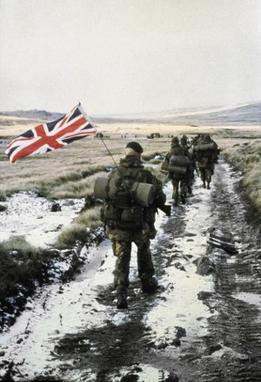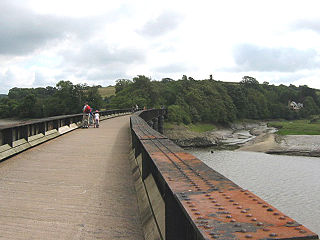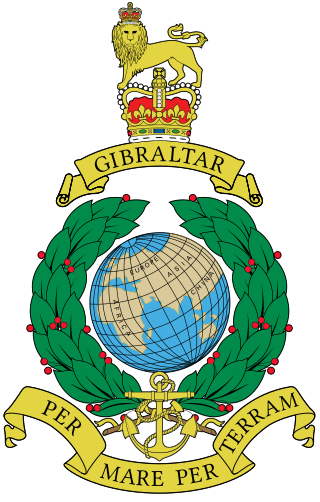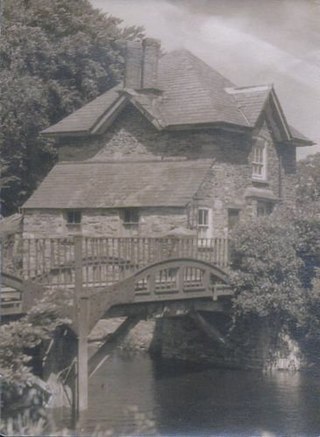
Dartmoor is an upland area in southern Devon, South West England. The moorland and surrounding land has been protected by National Park status since 1951. Dartmoor National Park covers 954 km2 (368 sq mi).

The Devonport Leat is a leat in Devon constructed in the 1790s to carry fresh drinking water from the high ground of Dartmoor to the expanding dockyards at Plymouth Dock.

The River Plym is a river in Devon, England. It runs from Dartmoor in the centre of the county southwest to meet the River Meavy, then south towards Plymouth Sound. The river is popular with canoeists, and the Plym Valley Railway runs alongside a section of the river.

Okehampton is a town and civil parish in West Devon in the English county of Devon. It is situated at the northern edge of Dartmoor, and had a population of 5,922 at the 2011 census. Two electoral wards are based in the town. Their joint population at the same census was 7,500.

Yomp is Royal Marines slang describing a long-distance loaded march carrying full kit. It was popularised by journalistic coverage in 1982 during the Falklands War. The origin of the word is unclear, and there is no evidence to suggest that it derives originally from an acronym. Various backronymic definitions have however been proposed, including "young officers marching pace", "your own marching pace" and a connection with the term yump used in rally-driving in the sense of "to leave the ground when taking a crest at speed", apparently a Scandinavian pronunciation of jump.

Ten Tors is an annual weekend hike in early May, on Dartmoor, southwest England. Organised by the British Army, starting in 1960, it brings together teams of six young people each, with the 2,400 young participants hiking to checkpoints on ten specified tors. The majority of entrants are schools, colleges, Scout groups and Cadet squadrons from South West England, though groups from across the UK have regularly taken part, as have teams from Australia and New Zealand. However, from 2012, only teams from the South West of England are eligible to take part, due to the large numbers of entrants.

The Dartmoor line is a 15+1⁄2-mile (24.9 km) railway line in Devon, England. From Crediton, the line runs alongside the Tarka Line to the site of the former Coleford Junction where it diverges west to Okehampton. Previously a heritage line, it is owned by Network Rail.

A pack animal, also known as a sumpter animal or beast of burden, is an individual or type of working animal used by humans as means of transporting materials by attaching them so their weight bears on the animal's back, in contrast to draft animals which pull loads but do not carry them.

The Two Moors Way is a long-distance trail mostly in Devon, UK, first established in 1976. It links Dartmoor and Exmoor and has been extended to become a Devon Coast-to-Coast trail.

The Tarka Trail is a series of footpaths and cyclepaths around north Devon, England that follow the route taken by the fictional Tarka the Otter in the book of that name. It covers a total of 180 miles (290 km) in a figure-of-eight route, centred on Barnstaple.

The All Arms Commando Course (AACC) lasts for 13 weeks and is run by the Royal Marines at the Commando Training Centre Royal Marines (CTCRM), Lympstone. Members from any of the United Kingdom's Regular Armed Forces and overseas exchange personnel can attend to serve with 3 Commando Brigade. On completion of the course the successful candidate earns the right to wear the green beret, and to wear the "Commando Dagger" on their uniform. The Royal Marines expect that nearly half of the volunteers will drop out or be dismissed before completing the AACC. The primary aim of the course is to give service personnel the core military skills necessary for Extremely and Very High readiness Commando and Littoral Strike operations.

The Royal Marines Reserve (RMR) is the volunteer reserve force used to augment the regular Royal Marines. The RMR consists of some 750 trained ranks distributed among the four units within the UK. About 10 percent of the force are working with the Regular Corps on long-term attachments in all of the Royal Marines regular units. All the volunteers within the RMR must pass through the same rigorous commando course as the regulars. The former may be civilians with no previous military experience or may be former regular Royal Marines.

Real World/Road Rules Challenge: Fresh Meat is the 12th season of the MTV reality game show, The Challenge.
Cornwall Search and Rescue Team was a volunteer organisation that provided inland search and rescue cover for the county of Cornwall, England. It has since been replaced by East Cornwall Search & Rescue Team and West Cornwall Search & Rescue Team.

The Plymouth and Dartmoor Railway (P&DR) was a 4 ft 6 in gauge railway built to improve the economy of moorland areas around Princetown in Devon, England. Independent carriers operated horse-drawn wagons and paid the company a toll. It opened in 1823, and a number of short branches were built in the next few years.

A loaded march is a relatively fast march over distance carrying a load and is a common military exercise.

The Dartmoor Yomp is an annual charitable fundraising event run in aid of the various charities that support injured British Armed Forces Royal Marines. The Yomp is a daytime trek held in the Dartmoor National Park in the county of Devon, England, usually some 12 miles (19 km) in length, and is undertaken by disabled servicemen joined by able-bodied former and serving Royal Marines and their immediate families. The challenge is usually held over two days in September: a get-together on the Friday and the actual Yomp on the Saturday. The Dartmoor Yomp takes its name from the Royal Marines slang term "yomp", meaning a route march carrying full kit. It was founded in 2008.

Charlotte Shaw was a fourteen-year-old British schoolgirl who drowned while crossing a swollen stream on Dartmoor during training for Ten Tors in 2007. Her death, the first to occur in connection with Ten Tors or one of its training expeditions, made national news headlines in the United Kingdom. She was with a group of students from Edgehill College trekking the route of Ten Tors in training for the main event when the group got into difficulties crossing a stream. Shaw slipped into the water and was washed downstream. She was located 20 minutes later by a Royal Navy search and rescue helicopter and airlifted to Derriford Hospital in Plymouth, where she died in the early hours of the next morning.
Royal Marines recruit training is the longest basic modern infantry training programme of any Commonwealth, or North Atlantic Treaty Organization (NATO) combat troops. The Royal Marines are the only part of the British Armed Forces where officers and other ranks are trained at the same location, the Commando Training Centre Royal Marines (CTCRM) at Lympstone, Devon. Much of the basic training is carried out on the rugged terrain of Dartmoor and Woodbury Common with a significant proportion taking place at night.
The eighth season of the Australian version of the original NBC reality television series The Biggest Loser, known as The Biggest Loser Australia: The Next Generation, premiered on 17 March 2013 on Network Ten. This particular season has set a worldwide record, introducing the heaviest contestant in all of Biggest Loser history, Kevin Moore. Kevin along with his mother Rosemary have a combined weight of 355 kg (783 lbs). He weighs 255 kg (562 lbs) himself alone. It also featured the youngest contestant ever on the Australian series - Todd Nester, who was 15 years old. Season 8 of The Biggest Loser was won by the Orange team, Robyn & Katie.


















